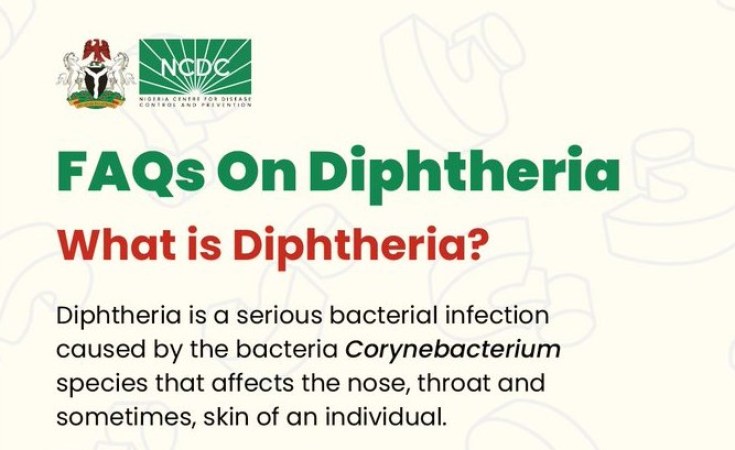While some children are partially vaccinated, NPHCDA said others are not, hence compromising the country's goal of achieving population immunity.
The National Primary Health Care Development Agency (NPHCDA), on Monday, said a significant number of children are yet to be vaccinated against diphtheria, a bacterial infection.
The Executive Director of NPHCDA, Faisal Shuaib, during a joint news conference on diphtheria outbreak response in Abuja, Nigeria's Federal Capital Territory, said this is despite efforts made by the Nigerian government to provide safe and cost-effective vaccines against the disease.
Mr Shuaib said while some children are partially vaccinated, others are not; hence compromising the country's goal of achieving population immunity.
He said the suboptimal vaccination coverage has been the main factor contributing to the diphtheria outbreaks, with the most affected age group being between 2-14 years.
He said the immunisation agency in collaboration with the Federal Ministry of Health, Nigeria Centre for Disease Control (NCDC), state governments, and donor partners, is mobilising all necessary resources to respond effectively to this outbreak.
He said to facilitate the immediate response plan, the agency is leveraging surveillance data from NCDC and direct information from the states to ensure effective planning and resource deployment.
"A comprehensive response plan has been activated to detect cases early, contain the spread, and prevent further transmission through a multi-phased strategy," he said.
"The Agency is working closely with partners to ensure adequate supplies of Tetanus Td (tetanus and diphtheria) for children four to 14 years and Pentavalent vaccines for children under four years."
Mass Vaccination
Mr Shuaib said the agency is currently collaborating with the affected state's team and other stakeholders to conduct intensified mass vaccinations for identified at-risk populations in the affected states.
He said the team is administering pentavalent, tetanus and diphtheria vaccines.
"Additionally, we are conducting awareness campaigns to educate the public about the disease, its symptoms, and preventive measures."
He said the vaccination campaign would utilise both fixed and mobile teams.
"Parents and caregivers are therefore urged to take their children, from birth to 14 years, to nearby health facilities for vaccination with the pentavalent or Td vaccines and another age-appropriate vaccine," he said.
Response to outbreak
Mr Shuaib said the response to the ongoing diphtheria outbreak would be carried out in two phases.
He said phase one, which is the immediate response, will encompass 25 LGAs across four states: Bauchi, Katsina, Yobe, and Kaduna and is scheduled to begin on 7 August to 11 August.
He said the second phase will cover outbreak response in 171 LGAs while six states; Kano, Katsina, FCT, Yobe, Kaduna, and Bauchi will have a state-wide outbreak response.
"While there will be targeted outbreak responses in LGAs across eight states: Jigawa (eight LGAs), Borno (four LGAs), Osun (four LGAs), Lagos (three LGAs), Zamfara (three LGAs), Gombe (three LGAs), Plateau (one LGA), and Nasarawa (one LGA)," he said.
"This phase is planned to be conducted in three rounds. The first round will commence on 21 August, followed by the second and third rounds tentatively set for 18 September and 16 October, respectively. Each of these three rounds will span five days."
About Diphtheria
Diphtheria is a serious bacterial infection caused by the Corynebacterium species that affects the nose, throat, and sometimes, an individual's skin.
The NCDC noted that people most at risk of contracting diphtheria are children and adults who have not received any or a single dose of the pentavalent vaccine, people who live in a crowded environment, in areas with poor sanitation and healthcare workers who are exposed to suspected or confirmed cases of diphtheria.
The agency noted that the disease spreads easily between people through direct contact with infected people, droplets from coughing or sneezing, and contact with contaminated clothing and objects.
The symptoms of diphtheria include fever, runny nose, sore throat, cough, red eyes (conjunctivitis) and neck swelling. In severe cases, NCDC said, a thick grey or white patch appears on the tonsils and/or at the back of the throat, causing difficulty in breathing.
From May 2022 to July 2023, an estimated 2,455 suspected cases have been reported in 26 states in Nigeria.
As of July 27, 2023, 836 of these cases have been confirmed in 33 LGAs across eight states: Cross River, Kano, Katsina, Kaduna, Lagos, Osun, Yobe, and FCT.
Tragically, 83 deaths have been reported from these confirmed cases, making vaccination against this deadly disease critically important, especially for children.


